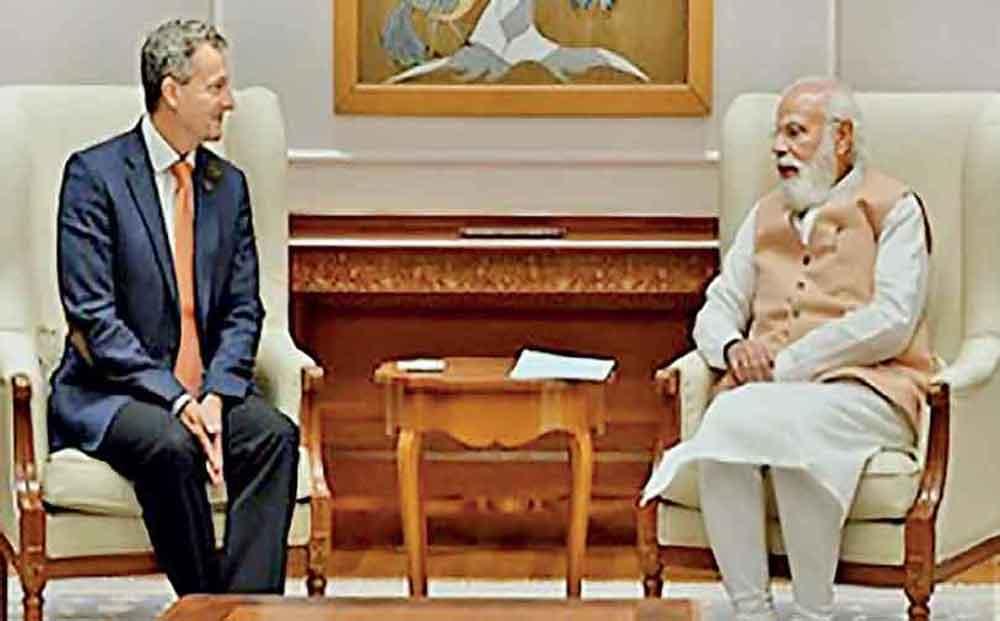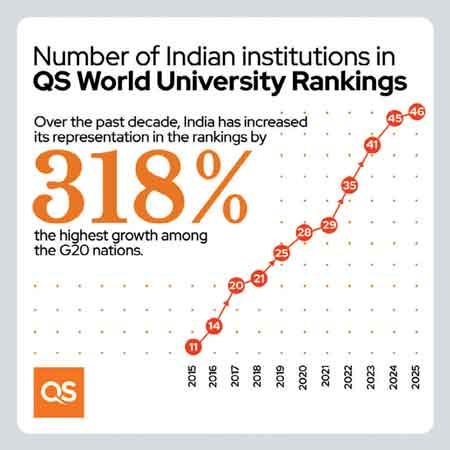Reply To:
Name - Reply Comment

As India looks towards the future, Prime Minister Modi (right) has reiterated his government’s commitment to further bolstering research and innovation in the education sector
 In a resounding testament to India’s growing prowess in higher education, the latest QS World University Rankings report has unveiled a remarkable surge in the rankings of Indian universities. This milestone achievement has not only garnered accolades from the CEO of QS Quacquarelli Symonds Nunzio Quacquarelli, who congratulated Prime Minister Narendra Modi for his leadership, but has also drawn praise from PM Modi himself, who commended the collective efforts of students, faculty, and institutions in achieving this milestone.
In a resounding testament to India’s growing prowess in higher education, the latest QS World University Rankings report has unveiled a remarkable surge in the rankings of Indian universities. This milestone achievement has not only garnered accolades from the CEO of QS Quacquarelli Symonds Nunzio Quacquarelli, who congratulated Prime Minister Narendra Modi for his leadership, but has also drawn praise from PM Modi himself, who commended the collective efforts of students, faculty, and institutions in achieving this milestone.
Under the stewardship of Prime Minister Modi, Indian universities have witnessed an unprecedented transformation over the past decade. From a modest count of 11 institutions in 2015 to a commendable tally of 46 in the latest rankings, India has experienced a staggering 318% increase, surpassing all other G20 nations in this regard. This exponential growth underscores the government’s steadfast commitment to enhancing the quality of education and fostering a culture of innovation and excellence across academia.
The QS report reveals that a remarkable 61% of Indian universities have ascended in their rankings, reaffirming India’s emergence as a global education hub. With 46 ranked institutions, India now boasts the third largest representation in Asia, trailing only behind Japan and China. Among these institutions, IIT-Bombay has emerged as a frontrunner, leaping from 149th to 118th position, followed closely by IIT-Delhi, which climbed an impressive 47 positions to secure the 150th spot. Additionally, IISC Bangalore, IIT Kharagpur, and IIT Madras have demonstrated notable advancements, further consolidating India’s position on the global academic map.
The University of Delhi (DU) has also made significant strides, ascending 79 spots to claim the 328th position, while IIT Guwahati, IIT Roorkee, and Anna University have showcased commendable progress, underscoring the diversity and excellence inherent in India’s higher education landscape.
Moreover, the QS report highlights a surge in research output among Indian universities, with as many as 37 institutions improving in citations per faculty. Notably, IIT-Bombay and IIT-Delhi have witnessed exponential growth in research citations, signaling a robust expansion in academic contributions and knowledge dissemination. The significant increase in research output underscores India’s growing influence in the global research arena and its commitment to fostering innovation-driven growth.
As India looks towards the future, Prime Minister Modi has reiterated his government’s commitment to further bolstering research and innovation in the education sector. With a focus on qualitative improvements and an emphasis on nurturing talent and fostering interdisciplinary collaboration, India is poised to scale even greater heights in the global academic landscape.
In conclusion, India’s stellar performance in the QS World University Rankings is a testament to the transformative vision of Prime Minister Narendra Modi and the unwavering dedication of students, faculty, and institutions towards excellence in education and research. As India continues on its trajectory of growth and development, its burgeoning academic prowess will undoubtedly serve as a beacon of inspiration for generations to come.